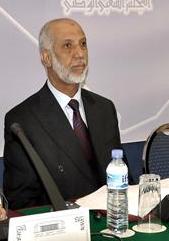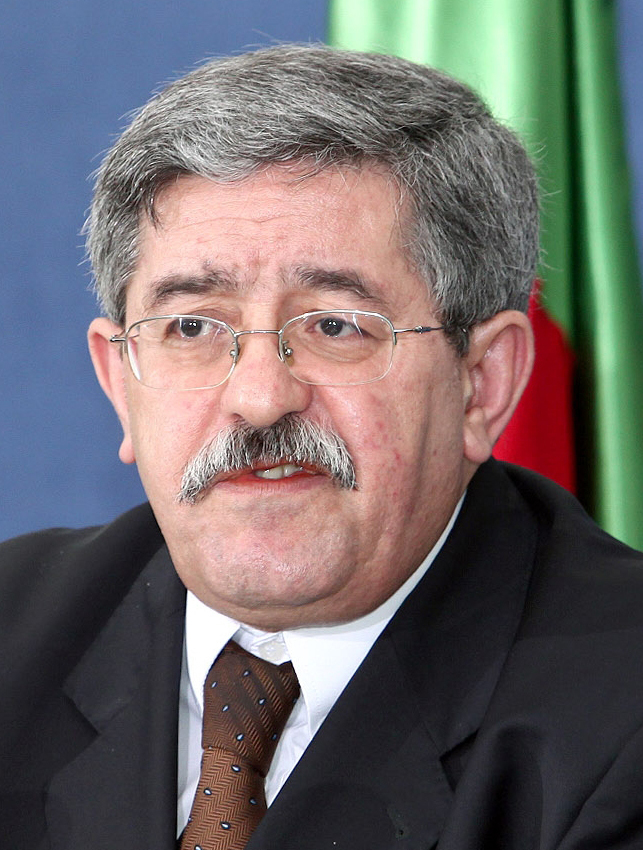|
Ahd 54
Ahd 54 ( ar, عهد 54), "Generation of '54", is a minor Algerian party led by human rights-activist Ali Fawzi Rebaine, who claims to have founded the first Algerian human rights organization. Its name is an allusion to the start of the Algerian War of Independence The Algerian War, also known as the Algerian Revolution or the Algerian War of Independence,( ar, الثورة الجزائرية '; '' ber, Tagrawla Tadzayrit''; french: Guerre d'Algérie or ') and sometimes in Algeria as the War of 1 November ..., in November 1954. In the 2007 election, it won 2.26% of the vote and two seats in the Algerian parliament. Electoral history Presidential elections People's National Assembly elections References External links Ahd 54website archive from 2010. Political parties in Algeria {{Algeria-party-stub ... [...More Info...] [...Related Items...] OR: [Wikipedia] [Google] [Baidu] |
Ali Fawzi Rebaine
Ali Fawzi Rebaine ( ar, علي فوزي رباعين) (born 24 January 1955 in Algiers) is the leader of the Ahd 54 political party in Algeria. He is an optician and human rights-activist, and claims to have founded Algeria's first independent human rights association. In 1983-84 and again in 1985–87, he was imprisoned by the Algerian government for endangering the security of the state and forming an illegal association. Rebaine founded Ahd 54 (named after the start of the Algerian War of Independence The Algerian War, also known as the Algerian Revolution or the Algerian War of Independence,( ar, الثورة الجزائرية '; '' ber, Tagrawla Tadzayrit''; french: Guerre d'Algérie or ') and sometimes in Algeria as the War of 1 November ... in 1954) and became its first secretary-general in 1991. He was re-elected in 1998, although the party has had little impact on Algerian politics. Rebaine ran again as its candidate in the Algerian presidential election of 2004, ... [...More Info...] [...Related Items...] OR: [Wikipedia] [Google] [Baidu] |
Algerian Nationalism
Algerian nationalism is pride in the Algerian identity and culture. It has been historically infuenced by the conflicts between the conflicts between the Deylik of Algiers and European countries, the French conquest of Algeria and the subsequent French colonial rule in Algeria, the Algerian War, and since independence by socialist and Islamic ideologies.James McDougall. ''History and the Culture of Nationalism in Algeria''. Cambridge, England, UK: Cambridge University Press, 2006. Pp. 25. During the Algerian War, the National Liberation Front was the principal Algerian nationalist movement, and Algerian nationalism was understood as a movement part of the wider Arab nationalism and Pan-Arabism. Early manifestations Formation of the Algerian identity It is hard to designate when Algerian identity formed. Medieval islamic chroniclers divided the Maghreb region into three distinctive geographical and cultural regions before the Regency of Algiers (Dawla al-Jaza'ir) was esta ... [...More Info...] [...Related Items...] OR: [Wikipedia] [Google] [Baidu] |
Human Rights
Human rights are Morality, moral principles or Social norm, normsJames Nickel, with assistance from Thomas Pogge, M.B.E. Smith, and Leif Wenar, 13 December 2013, Stanford Encyclopedia of PhilosophyHuman Rights Retrieved 14 August 2014 for certain standards of human behaviour and are regularly protected in Municipal law, municipal and international law. They are commonly understood as inalienable,The United Nations, Office of the High Commissioner of Human RightsWhat are human rights? Retrieved 14 August 2014 fundamental rights "to which a person is inherently entitled simply because she or he is a human being" and which are "inherent in all human beings",Burns H. Weston, 20 March 2014, Encyclopædia Britannicahuman rights Retrieved 14 August 2014. regardless of their age, ethnic origin, location, language, religion, ethnicity, or any other status. They are applicable everywhere and at every time in the sense of being Universality (philosophy), universal, and they are Egalitari ... [...More Info...] [...Related Items...] OR: [Wikipedia] [Google] [Baidu] |
Algeria
) , image_map = Algeria (centered orthographic projection).svg , map_caption = , image_map2 = , capital = Algiers , coordinates = , largest_city = capital , religion = , official_languages = , languages_type = Other languages , languages = Algerian Arabic (Darja) French , ethnic_groups = , demonym = Algerian , government_type = Unitary semi-presidential republic , leader_title1 = President , leader_name1 = Abdelmadjid Tebboune , leader_title2 = Prime Minister , leader_name2 = Aymen Benabderrahmane , leader_title3 = Council President , leader_name3 = Salah Goudjil , leader_title4 = Assembly President , leader_name4 = Ibrahim Boughali , legislature = Parliament , upper_house = Council of the Nation , lower_house ... [...More Info...] [...Related Items...] OR: [Wikipedia] [Google] [Baidu] |
Algerian War Of Independence
The Algerian War, also known as the Algerian Revolution or the Algerian War of Independence,( ar, الثورة الجزائرية '; '' ber, Tagrawla Tadzayrit''; french: Guerre d'Algérie or ') and sometimes in Algeria as the War of 1 November, was fought between France and the Algerian National Liberation Front (french: Front de Libération Nationale – FLN) from 1954 to 1962, which led to Algeria winning its independence from France. An important decolonization war, it was a complex conflict characterized by guerrilla warfare and war crimes. The conflict also became a civil war between the different communities and within the communities. The war took place mainly on the territory of Algeria, with repercussions in metropolitan France. Effectively started by members of the National Liberation Front (FLN) on 1 November 1954, during the ("Red All Saints' Day"), the conflict led to serious political crises in France, causing the fall of the Fourth Republic (1946–58), to b ... [...More Info...] [...Related Items...] OR: [Wikipedia] [Google] [Baidu] |
Algerian Presidential Election, 2004
Presidential elections were held in Algeria on 8 April 2004. IFES Incumbent President was re-elected with 85% of the vote. Candidates * Ali Benflis, candidate of the National Liberation Front (FLN) *, candidate of a coalition including the |
Algerian Presidential Election, 2009
Presidential elections were held in Algeria on 9 April 2009. The result was a victory for incumbent President Abdelaziz Bouteflika, who was re-elected with 90% of the vote. Background The Council of Ministers announced on 3 November 2008 that a planned constitutional revision would remove the two-term limit on the presidency that was previously included in Article 74, thereby enabling Bouteflika to run for a third term. The People's National Assembly endorsed the removal of the term limit on 12 November 2008, with only the Rally for Culture and Democracy (RCD) voting against its removal."Algerian opposition pulls out of 'pathetic' presidential vote" AFP, 15 January 2009. Candidates Thirteen candidates submitted papers to contest th ...[...More Info...] [...Related Items...] OR: [Wikipedia] [Google] [Baidu] |
Algerian Presidential Election, 2014
Presidential elections were held in Algeria on 17 April 2014. Incumbent President Abdelaziz Bouteflika was re-elected with 82% of the vote. Issues in the campaign included a desire for domestic stability after the bloody civil war of the 1990s, the state of the economy (30% unemployment), the frail health of the 15 year incumbent and 77-year-old president whose speech was "slurred and inaudible" in his only public outing during the campaign, and the less-than-wholehearted support given the president by the normally united and discrete ruling class. Background Following the 2009 presidential elections, the region and the country (to a lesser degree) was engulfed by the Arab Spring. A series of protests took place between 2010 and 2012, but the country did not undergo regime change unlike neighbouring Tunisia and Libya. Candidates In November 2013, the National Liberation Front endorsed the ailing incumbent Abdelaziz Bouteflika as its candidate in the race. Bouteflika's candida ... [...More Info...] [...Related Items...] OR: [Wikipedia] [Google] [Baidu] |
Algerian Legislative Election, 1991
Parliamentary elections were held in Algeria on 26 December 1991. They were the first multi-party elections since independence, but were cancelled by a military coup after the first round when the military expressed concerns that the Islamic Salvation Front, which was almost certain to win more than the two-thirds majority of seats required to change the constitution, would form an Islamic state. The annulling of the elections led to the outbreak of the Algerian Civil War. Of 430 seats contested, 232 were won outright with 50% or more of the first-round vote; the remaining 198 would have proceeded to a second round contested only by the two candidates with the highest number of votes. Voter turnout in the first-round was 59.0%. Dieter Nohlen, Michael Krennerich & Bernhard Thibaut (1999) ''Elections in Africa: A data handbook'', p54 Results Notes References {{Algerian elections Elections in Algeria Algeria ) , image_map = Algeria (centered orthographic ... [...More Info...] [...Related Items...] OR: [Wikipedia] [Google] [Baidu] |
Algerian Legislative Election, 2007
Legislative elections were held in Algeria on 17 May 2007. 24 political parties and around 100 independent lists with a total of more than 12,000 candidates competed for the 389 seats in the National People's Assembly. While most Algerians voted on May 17, immigrants from Algeria to other countries (especially France) and Algerians living in the Sahara (i.e. Southern Algeria) and other nomads and semi-nomads voted on May 16 due to the distance from Algiers, the country's capital. At 35% of the 18.7 million voters, the turnout was the lowest in Algerian history. Several political organisations, notably the Socialist Forces Front, the ex-communist Democratic and Social Movement, leading members of the former Islamic Salvation Front (Abbassi Madani and Ali Belhadj), the main faction of the split Islamist Islah Party, and the newly formed organisation Rachad, had called on their supporters to boycott these elections. These political groups claimed that the elections were consisten ... [...More Info...] [...Related Items...] OR: [Wikipedia] [Google] [Baidu] |
Algerian Legislative Election, 2012
Legislative elections were held in Algeria on 10 May 2012. The incumbent coalition, consisting of the FLN of President Abdelaziz Bouteflika and the RND of Prime Minister Ahmed Ouyahia, held on to power after winning a majority of seats. The Islamist parties of the Green Algeria Alliance lost seats. Background Following events in the Arab Spring, Algeria faced initial large scale protests but have since dwindled. An election in 1991 that resulted in a plurality for the Islamic Salvation Front was annulled by the military amid fears of an Islamist takeover causing the Algerian Civil War. Parties Workers' Party The Workers' Party (PT) announced its participation on 29 February. Louisa Hanoune has previously clarified that the party had worked with the Socialist Forces Front and would look towards an alliance between the two parties. Louisa Hanoune has become the most popular woman in Algeria after the party came second in the 2009 Algerian presidential election. Hanoune ... [...More Info...] [...Related Items...] OR: [Wikipedia] [Google] [Baidu] |
Algerian Legislative Election, 2017
Parliamentary elections were held in Algeria on 4 May 2017 to elect all 462 members of the People's National Assembly. The ruling National Liberation Front lost 44 seats, but remained the largest party in the People's National Assembly with 164 members. Electoral system The 462 members of the People's National Assembly are elected by proportional representation from 48 multi-member constituencies based on the provinces. Seats are allocated using the largest remainder method.Al-Majlis Al-Chaabi Al-Watani (National People's Assembly) IPU Campaign Candidates began campaigning on 9 April 2017. Parties boycotting the elections included Talaie El-Houriat and Jil Jadid, whilst the Union of Democratic and Social Forces was not authorised.Results [...More Info...] [...Related Items...] OR: [Wikipedia] [Google] [Baidu] |
.jpg)
.jpeg)


